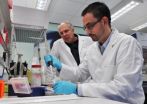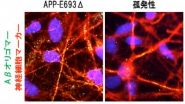(Press-News.org) Scientists from the University of Southampton have identified the molecular system that contributes to the harmful inflammatory reaction in the brain during neurodegenerative diseases.
An important aspect of chronic neurodegenerative diseases, such as Alzheimer's, Parkinson's, Huntington's or prion disease, is the generation of an innate inflammatory reaction within the brain.
Results from the study open new avenues for the regulation of the inflammatory reaction and provide new insights into the understanding of the biology of microglial cells, which play a leading role in the development and maintenance of this reaction.
Dr Diego Gomez-Nicola, from the CNS Inflammation group at the University of Southampton and lead author of the paper, says: "The understanding of microglial biology during neurodegenerative diseases is crucial for the development of potential therapeutic approaches to control the harmful inflammatory reaction. These potential interventions could modify or arrest neurodegenerative diseases like Alzheimer disease.
"The future potential outcomes of this line of research would be rapidly translated into the clinics of neuropathology, and would improve the quality of life of patients with these diseases."
Microglial cells multiply during different neurodegenerative conditions, although little is known about to what extent this accounts for the expansion of the microglial population during the development of the disease or how it is regulated.
Writing in The Journal of Neuroscience, scientists from the University of Southampton describe how they used a laboratory model of neurodegeneration (murine prion disease), to understand the brain's response to microglial proliferation and dissected the molecules regulating this process. They found that signalling through a receptor called CSF1R is a key for the expansion of the microglial population and therefore drugs could target this.
Dr Diego Gomez-Nicola adds: "We have been able to identify that this molecular system is active in human Alzheimer's disease and variant Creutzfeldt–Jakob disease, pointing to this mechanism being universal for controlling microglial proliferation during neurodegeneration. By means of targeting CSF1R with selective inhibitors we have been able to delay the clinical symptoms of experimental prion disease, also preventing the loss of neurons."
INFORMATION:
The research has been funded by a Marie Curie fellowship from the European Union and a pilot research grant from Alzheimer's Research UK.
Scientists identify molecular system that could help develop treatments for Alzheimer's disease
2013-02-21
ELSE PRESS RELEASES FROM THIS DATE:
The long shadow cast by childhood bullying on mental health in adulthood
2013-02-21
A new study shows that children who are exposed to bullying during childhood are at increased risk of psychiatric disorders in adulthood, regardless of whether they are victims or perpetrators.
Professor William E. Copeland of Duke University Medical Center and Professor Dieter Wolke of the University of Warwick led a team in examining whether bullying in childhood predicts psychiatric problems and suicidality in young adulthood. While some still view bullying as a harmless rite of passage, research shows that being a victim of bullying increases the risk of adverse outcomes ...
Early life stress may take early toll on heart function
2013-02-21
AUGUSTA, Ga. – Early life stress like that experienced by ill newborns appears to take an early toll of the heart, affecting its ability to relax and refill with oxygen-rich blood, researchers report.
Rat pups separated from their mothers a few hours each day, experienced a significant decrease in this basic heart function when – as life tends to do – an extra stressor was added to raise blood pressure, said Dr. Catalina Bazacliu, neonatologist at the Medical College of Georgia and Children's Hospital of Georgia at Georgia Regents University. Bazacliu worked under the ...
Modeling Alzheimer's disease using iPSCs
2013-02-21
Kyoto, Japan – Working with a group from Nagasaki University, a research group at the Center for iPS Cell Research and Application (CiRA) at Japan's Kyoto University has announced in the Feb. 21 online publication of Cell Stem Cell has successfully modeled Alzheimer's disease (AD) using both familial and sporadic patient-derived induced pluripotent stem cells (iPSCs), and revealed stress phenotypes and differential drug responsiveness associated with intracellular amyloid beta oligomers in AD neurons and astrocytes.
In a study published online in Cell Stem Cell, Associate ...
Schizophrenia genes increase chance of IQ loss
2013-02-21
People who are at greater genetic risk of schizophrenia are more likely to see a fall in IQ as they age, even if they do not develop the condition.
Scientists at the University of
Edinburgh say the findings could lead to new research into how different genes for schizophrenia affect brain function over time. They also show that genes associated with schizophrenia influence people in other important ways besides causing the illness itself.
The researchers used the latest genetic analysis techniques to reach their conclusion on how thinking skills change with age.
They ...
EASL publishes first comprehensive literature review on the burden of liver disease in Europe
2013-02-21
Brussels and Geneva, 20th February 2013 --- Major progress has been made in the past 30 years in the knowledge and management of liver disease, yet approximately 29 million Europeans still suffer from a chronic liver condition.
The European Association for the Study of the Liver (EASL) today unveiled its new publication The burden of liver disease in Europe: a review of available epidemiological data. Key findings in the report suggest that alcohol consumption, viral hepatitis B and C and metabolic syndromes related to overweight and obesity are the leading causes of ...
Omega-3s inhibit breast cancer tumor growth, study finds
2013-02-21
A lifelong diet rich in omega-3 fatty acids can inhibit growth of breast cancer tumours by 30 per cent, according to new research from the University of Guelph.
The study, published recently in the Journal of Nutritional Biochemistry, is believed to be the first to provide unequivocal evidence that omega-3s reduce cancer risk.
"It's a significant finding," said David Ma, a professor in Guelph's Department of Human Health and Nutritional Sciences, and one of the study's authors.
"We show that lifelong exposure to omega-3s has a beneficial role in disease prevention ...
Microbubbles improve myocardial remodelling after infarction
2013-02-21
Scientists from the Bonn University Hospital successfully tested a method in mice allowing the morphological and functional sequelae of a myocardial infarction to be reduced. Tiny gas bubbles are made to oscillate within the heart via focused ultrasound - this improves microcirculation and decreases the size of the scar tissue. The results show that the mice, following myocardial infarction, have improved cardiac output as a result of this method, as compared to untreated animals. The study is now being presented in the professional journal PLOS ONE.
Every year in Germany, ...
Inhaled betadine leads to rare complication
2013-02-21
Philadelphia, Pa. (February 21, 2013) - A routine step in preparing for cleft palate surgery in a child led to an unusual—but not unprecedented—case of lung inflammation (pneumonitis), according to a report in the The Journal of Craniofacial Surgery. The journal, edited by Mutaz B. Habal, MD, FRCSC, is published by Lippincott Williams & Wilkins, a part of Wolters Kluwer Health.
The complication resulted from accidental inhalation of povidone-iodine (PI), or Betadine—an antiseptic widely used before surgery. The rare complication led to new surgical "prep" steps to reduce ...
Human heart development slower than other mammals
2013-02-21
The walls of the human heart are a disorganised jumble of tissue until relatively late in pregnancy, despite having the shape of a fully functioning heart, according to a pioneering study.
Experts from the University of Sheffield's Medical School collaborated on research to create the first comprehensive model of human heart development using observations of living foetal hearts. The results showed surprising differences from existing animal models.
Although scientists saw four clearly defined chambers in the foetal heart from the eighth week of pregnancy, they did ...
The age from when children can hop on one leg
2013-02-21
This press release is available in German. Motor development in children under five years of age can now be tested reliably: Together with colleagues from Lausanne, researchers from the University Children's Hospital Zurich and the University of Zurich have determined normative data for different exercises such as hopping or running. This enables parents and experts to gage the motor skills of young children for the first time objectively and thus identify abnormalities at an early stage.
My child still can't stand on one leg or walk down the stairs in alternating ...


